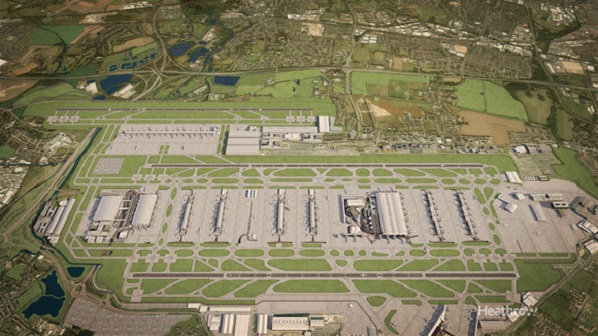Heathrow expansion wins UK government approval

Expansion of Heathrow will see a third runway built to the north-east of the airport
After years of delay, the UK government has announced its support for a new runway at London Heathrow.
If finalised, the development will see the first full length runway built in the south-east of England since the Second World War.
The scheme will now be taken forward in the form of a draft ‘National policy statement’ for consultation.
This process is expected to take upward of a year.
“The government’s decision on its preferred location, which will be consulted on in the new year, underlines its commitment to keeping the UK open for business now and in the future and as a hub for tourism and trade,” read a statement.
A new runway at Heathrow will bring economic benefits to passengers and the wider economy worth up to £61 billion, argued the government.
Up to 77,000 additional local jobs are expected to be created over the next 14 years and the airport has committed to create 5,000 new apprenticeships over the same period.
A second runway at Gatwick was also on the table, but has been rejected by ministers.
Transport secretary Chris Grayling said: “I am proud that after years of discussion and delay this government is taking decisive action to secure the UK’s place in the global aviation market – securing jobs and business opportunities for the next decade and beyond.
“A new runway at Heathrow will improve connectivity in the UK itself and crucially boost our connections with the rest of the world, supporting exports, trade and job opportunities.
“This isn’t just a great deal for business; it’s a great deal for passengers who will also benefit from access to more airlines, destinations and flights.”
Heathrow currently handles more freight by value than all other UK airports combined, accounting for 31 per cent of the UK’s non-EU trade.
It is hoped passengers will also benefit from a greater choice of airlines, destinations and flight times.
The Airports Commission, chaired by Sir Howard Davies, anticipated that a new runway would bring in new capacity to meet demand and allow greater levels of competition, lowering fares even after taking into account the costs of construction.
Expansion costs will be paid for by the private sector.
However, the taxpayer will meet the costs of developing corresponding infrastructure.
It will be for the Civil Aviation Authority, as the independent industry regulator, to work with Heathrow Airport and airlines operating at the airport, on the detailed design and costs to ensure the scheme remains affordable.
Despite the increase in flights, Heathrow has made firm commitments to noise reduction, a prime concern for those opposed to the development.
The government will propose that a six-and-a-half hour ban on scheduled night flights will be introduced for the first time at Heathrow and will make more stringent night noise restrictions a requirement of expansion.
The timing of this ban will be determined through consultation.
Ufi Ibrahim, chief executive, British Hospitality Association said: “We welcome the government’s decision on airport expansion at Heathrow.
“The challenge from other European hub-airports vying to replace Heathrow is serious, especially once the United Kingdom has left the European Union.
“This decision demonstrates that the UK is open to visitors and investment from across the globe, and will also allow space for domestic air links to support regional tourism right across the country.”
Airport expansion will be delivered through a thorough, faster planning process, under the 2008 Planning Act and 2011 Localism Act.
The government will set out the airport scheme it wants, along with supporting evidence, in its NPS.
Industry gave the decision a muted welcome, given the impact of further delays.
James Stamp, global head of aviation at KPMG, commented: “Now, more than ever, UK plc. needs to demonstrate both its ability and willingness
to connect to trading partners and investors in the rest of the world.
“Unfortunately, while the cabinet commitment to a Heathrow scheme is positive, the additional delay sends a mixed and somewhat indecisive message to business and global investors.
“In the UK, it means businesses still can’t really plan.
“To the rest of the world, this country looks increasingly isolated, and unable (or unwilling) to move forward with pace and vision.”

